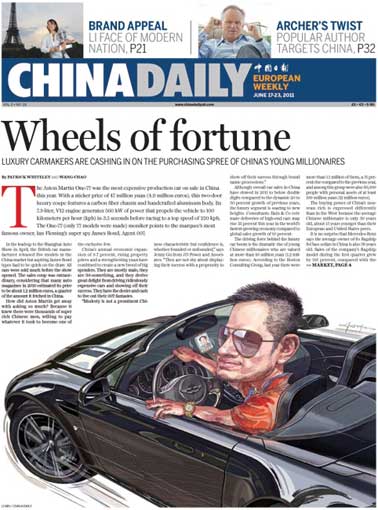Op-Ed Contributors
Seeking a diplomacy of amity
Updated: 2011-06-17 07:37
By Dong Qingling (China Daily)
The ongoing South China Sea dispute has drawn attention to China's defense policy and military diplomacy. Speaking at the recent Shangri-La Dialogue in Singapore, Defense Minister Liang Guanglie reiterated that the Chinese military is committed to enhancing mutual understanding, boosting mutual trust, advancing cooperation, and building a new-type of military-to-military relationship of mutual respect, cooperation and mutual benefit.
A rising China is not interested in establishing its hegemony. It has its own strategic culture that honors diplomatic norms and values in letter and spirit.
China has had many philosophers and sages who have influenced Chinese people's thinking over the ages. Mozi (ca 470-400 BC) was one of them. And though he is not famous as a scholar of international relations, he seriously explored two key questions. How does a country survive in a world full of dangers and ruthless competition? And how can harmony be maintained in the long term?
Mozi said defensive strategies are more conducive than offensive for a country's survival. He was strongly against unjust wars, which, he said, would only provoke fierce resistance and trigger moral condemnation from all quarters. The price of aggression would include not only material loss, but also the loss of prestige and reputation. This means the cost of offensive strategy far outweighs the gains.
Besides, expansion often results in a country's rapid decline because of higher consumption of wealth and because a country with an offensive strategy usually prompts anti-aggression forces to join hands against the common threat. As a result, disorder creeps in and the state slides into a more dangerous situation.
Mozi supported defensive strategies, and said: "defenders shall defeat their enemies first", which should be especially reread today.
Influenced by traditional strategic culture, China has been a self-disciplined country throughout its history. Even during its strongest and most flourishing periods, Western Han (206 BC-AD 24) and Tang (AD 618-907) dynasties, China's policy toward other countries was peaceful, inclusive and one of self-discipline. And its relationship with neighbors has always been friendly.
One of the main reasons behind it is that the Chinese government, in ancient as well as modern times, has followed a self-limiting path of development. Dynastic rulers rightly realized a powerful and prosperous Middle Kingdom would make its neighbors uncomfortable and worried, a realization that has passed on to present times.
Even today, after nearly 30 years of reform and opening-up and the rise of the country as an economic powerhouse, China has not changed its foreign policy of developing friendly relations with neighbors and other countries.
Mozi said international relations are a kind of interpersonal ties that extend to the group level. It's people who built the world, and once we internalize the norms of universal love and mutual help through socialization, the factors that cause disorder in the system may be altered forever.
In other words, Mozi argues that what countries do in international relations, the interests they hold and the structures within which they operate are defined by social norms and ideas. If they internalize a set of norms and ideas that can easily cause conflicts, the world will be in turmoil. On the contrary, if they internalize a set of norms and ideas, advocating universal love and mutual help, the world will be one of harmony.
Like many liberal constructivists, Mozi insisted that international relations could avoid the curses of anarchy in this world by building a society of friendship.
To build a peaceful and harmonious world today, China is shouldering its responsibility as an emerging power by promoting the creation and internalization of some regional and global norms. With the rise of China's comprehensive capability, seeking friendly neighborly relations has become increasingly important, which the Chinese leadership is working on.
Moreover, China is adjusting its economic structure and changing its orientation toward domestic demand to eliminate the possibility of taking an assertive road as other rising powers did in the past.
It is for the international community to reciprocate this gesture for the peaceful development of the world without denying China the environment to discipline itself.
The author is a research scholar with the School of International Relations, China University of International Business and Economics.
E-paper

Pret-a-design
China is taking bigger strides to become a force in fashion.
Lasting Spirit
Running with the Beijingers
A twist in the tale
Specials

Mom’s the word
Italian expat struggles with learning English and experiences the joys of motherhood again.

Lenovo's challenge
Computer maker takes on iconic brand apple with range of stylish, popular products

Big win
After winning her first major title, Chinese tennis star could be marketing ace for foreign brands
